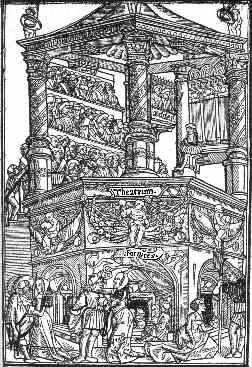A bawdy-house
The playhouses in London were near the brothels, for the good reason that both were rejected by the City. Puritan critics pointed out the association with some scorn. That the theatres were literally on the margins of society may have given the playwrights both incentive and licence to challenge many conventional attitudes of the time.
Here a medieval bawdy-house is illustrated. Notice that a "theatrum" is situated immediately above the "fornices," or bawdy-house. Women entertain their clients in front of the arched doorways. The proximity in London of play-house and brothel led to attacks by the City Fathers and puritan writers.
"Houses in the suburbs?"
Two of Shakespeare's plays, Measure for Measure and Pericles, give detailed insight into the life of the under-class which constituted the inhabitants and managers of brothels, and the upper class patrons of them.
Angelo, the newly-appointed deputy in the Vienna of Measure for Measure, gives orders that all the "houses in the suburbs"--brothels--should be pulled down; the sub-plot of the play is peopled with the bawds, prostitutes and patrons of the brothels. Not surprisingly, without suggesting that these activities are admirable, Shakespeare shows some sympathy for those caught in the cycle of poverty and disease. Pompey Bum, tapster, bawd, and amoral survivor, is given one of the great lines of the play: when challenged to admit the manner of his livelihood, he answers the judge Escalus, "Truly, sir, I am a poor fellow that would live" (2.1.221).
